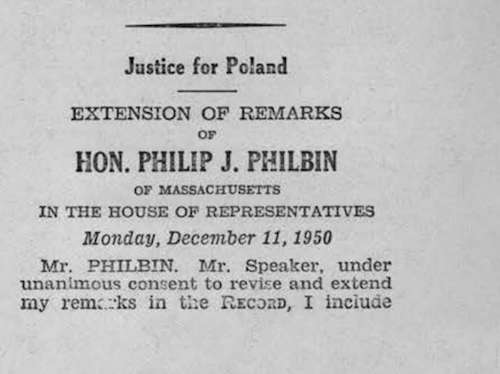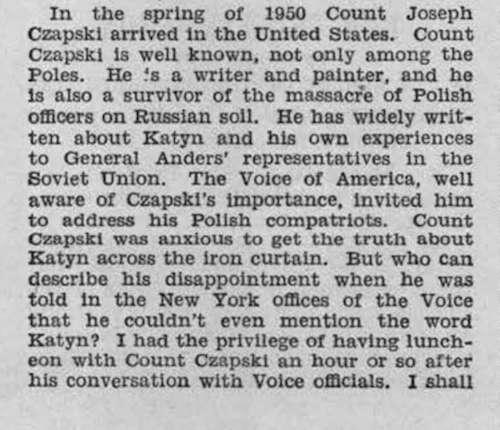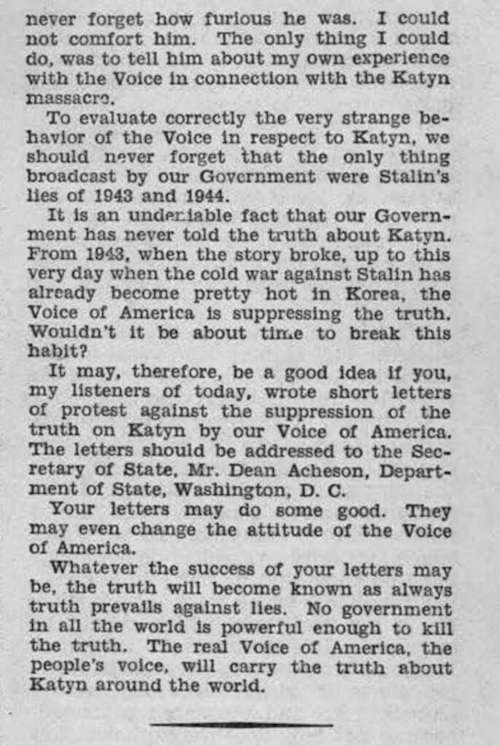Voice of America Censors Soviet Massacre Survivor Józef Czapski And Lies About Its Actions
On December 11, 1950, a member of the U.S. Congress revealed the Voice of America censorship of Józef Czapski, a Polish military officer, writer, artist, and a witness of Soviet war crimes. The U.S. government broadcaster, the Voice of America (VOA), partially censored Józef Czapski in 1950, when he tried to describe the Soviet mass murder of about 22,000 Polish military officers and intelligentsia leaders in Katyn in western Russia and at other locations.
According to journalist Julius Epstein, a pre-World War II Jewish refugee from Nazi Germany and Austria and former Office of War Information (OWI) editor who gave a sworn testimony to a U.S. congressional investigative committee, Czapski, who barely escaped death in Katyn, felt devastated by the VOA management’s censorship of his Katyn talk. On December 11, 1950, Rep. Philp J. Philbin (Democrat–Massachusetts) inserted in the Congressional Record Epstein’s description of the Voice of America’s censorship of Józef Czapski’s program about Katyn, which the VOA Polish Service management requested from him but later refused to air it as written, and lied about the circumstances of the incident, defending its actions and slandering Czapski.



In the spring of 1950 Count Joseph Czapski arrived in the United States. Count Czapski is well known not only among the Poles. He is a writer and painter, and he is also a survivor of the massacre of Polish officers on Russian soil. He has widely written about Katyn and his own experiences to General Anders’ representatives in the Soviet Union. The Voice of America, well aware of Czapski’s importance, invited him to address his Polish compatriots. Count Czapski was anxious to get the truth about Katyn across the iron curtain. But who can describe his disappointment when he was told in the New York offices of the Voice that he couldn’t even mention the word Katyn? I had the privilege of having luncheon with Count Czapski an hour or so after his conversation with Voice officials. I shall never forget how furious he was. I could not comfort him. The only thing I could do, was to tell him about my own experience with the Voice in connection with the Katyn massacre.
To evaluate correctly the very strange behavior of the Voice in respect to Katyn w should never forget that the only thing broadcast by our Government were Stalin’s lies of 1943 and 1944.
It is an undeniable fact that our Government has never told the truth about Katyn. From 1943, when the story broke, up to this very day when the cold war against Stalin has already become pretty hot in Korea, the Voice of America is suppressing the truth. Wouldn’t it be about time to break this habit?
It may, therefore, be a good idea if you, my listeners of today, wrote short letters of protest against the suppression of the truth on Katyn by our Voice of America. The letters should be addressed to thfe Sec retary of State, Mr. Dean Acheson, Department of State, Washington, D.C.
Your letters may do some good. They may even change the attitude of the Voice of America.
Whatever the success of your letters may be, the truth will become known as always truth prevails against lies. No government in all the world is powers enough to kill the truth. The real Voice of America, people’s voice, will carry the truth about Katyn around the world.
In an attempt to hide their censorship, Voice of America officials falsely claimed that the Polish officer, outstanding writer, and artist – one of the very few survivors of the Katyn murders and the person who had searched for the missing Polish officers in Russia whom Epstein mentioned in the excerpt inserted in the Congressional Record – had voluntarily agreed with the management of the VOA Polish Service to have references to Katyn eliminated from in his 1950 radio talk broadcast by VOA to Poland during his visit in the United States.
State Department diplomat and Soviet affairs specialist who was the Voice of America director from October 1949 to September 1952, Foy D. Kohler, denied all the charges made by Epstein and proceeded to tarnish his reputation to contacts outside of the U.S. government. In a memo dated December 18, 1951, which was declassified many years later, Kohler wrote that Mr. Epstein’s activities were “colored with the cast of the disappointed job seeker.” In the same memo, Kohler also suggested that Epstein himself should be investigated.
Finally, I cannot forbear adding that perhaps the time has arrived to investigate Mr.Epstein himself. His immigration status is not known but it is assumed he has become naturalized since taking out his first papers in 1942. His actions would seem to indicate that he is not be [sic] best type of new American citizen.
Czapski was in fact pressured by VOA’s management and was outraged by the censorship. Several years later, he wrote about it in a private letter (1959) to Polish-American scholar Prof. J.K. Zawodny, whose in-depth study of the Katyn massacre, Death in the Forest, was published by University of Nortre Dame Press in 1962.[ref]Prof. J.K. Zawodny wrote in his 1962 Katyn study “Death in the Forest”: “Even in the postwar years, after President Roosevelt had died, the war with Japan was over, and the U.N. Charter was already in effect—the policy of suppressing the Katyn case was continued by the State Department. The war was over for several years when Mr. Czapski, the man so activey engaged in searching for the missing men in Russia, and himself a survivor of the annihilation, came to the United States for a visit in the early spring of 1950. The Voice of America invited him to make a broadcast in the Polish language to Poland. From it officials of the Voice of America meticulously eliminated all references to the Katyn Massacre. He was not even allowed to mention the word ‘Katyn’.” (p. 186) In a footnote, Prof. Zawodny cited the 1952 Congressional Record and stated that this information was verified by Mr. Czapski in his letter of December 26, 1959. (p. 196)[/ref]
The Polish prisoners of war (POWs) were secretly executed in 1940 on the orders from Soviet dictator Joseph Stalin when Stalin and Hitler were allies. The Polish officers were in Soviet captivity following the joint German-Soviet invasion and occupation of Poland in 1939, which started the Second World War. Czapski was imprisoned in several Soviet camps. After his release, following the German attack on the Soviet Union, Captain Czapski (later promoted to Major) searched for the missing Polish officers and was repeatedly lied to by Soviet officials. The Soviet secret police murdered the officers, but Soviet officials and propagandists blamed the Germans for the massacre for many decades. The Voice of America promoted the Soviet Katyn propaganda lie during World War II. The Soviets and the Voice of America falsely insisted that the Germans committed the Katyn murders. After the war, the VOA management tried to limit reporting about the Katyn genocide murder until about 1952.
VOA was quickly rebuked by members of the U.S. Congress in 1950 for its censorship of Czapski. The Truman Administration later carried out personnel and management reforms at VOA and encouraged much fuller reporting on the Katyn story, but partial censorship returned later and lasted until the start of the Reagan administration.
Czapski’s mother was Austrian-Czech aristocrat Josephine von Thun und Hohenstein. His father was a Polish aristocrat. In his youth, Józef Czapski was a pacifist but later defended Poland in the 1920 war with Soviet Russia. At the start of World War II, he was mobilized as a reserve officer. His political outlook was highly liberal in the Christian and Catholic tradition. He was a strong supporter of political tolerance, except toward totalitarian ideologies on the right and the left, and a believer in multiculturalism. Czapski admired pre-Bolshevik Russian culture (he studied in St. Petersburg), spoke fluent Russian, and had many anti-communist Russian dissident friends. They included Alexander Solzhenitsyn, whom the Voice of America also banned and censored for several years in the 1970s to avoid upsetting U.S.-Soviet relations during the period of Cold War détente between Washington and Moscow.
The Voice of America Polish Service re-interviewed Józef Czapski, as a witness of the Soviet genocide of people of many nationalities, including Russians, when journalist Ted Lipien was in charge of the service during the Reagan administration in the 1980s.
The Voice of America resumed interviewing Solzhenitsyn during President Ronald Reagan’s administration.
The Voice of America management has never apologized to the families of Katyn victims for spreading Soviet propaganda during World War II, or to Czapski, Solzhenitsyn, and VOA audiences, for its limited censorship in favor of Soviet Russia during the Cold War.
Józef Czapski is now being rediscovered as an artist, writer, and a witness to history thanks to several books published about him in English in recent years.
He is now considered one of the greatest Polish painters of the 20th century and one of Poland’s most talented modern writers and essayists.


